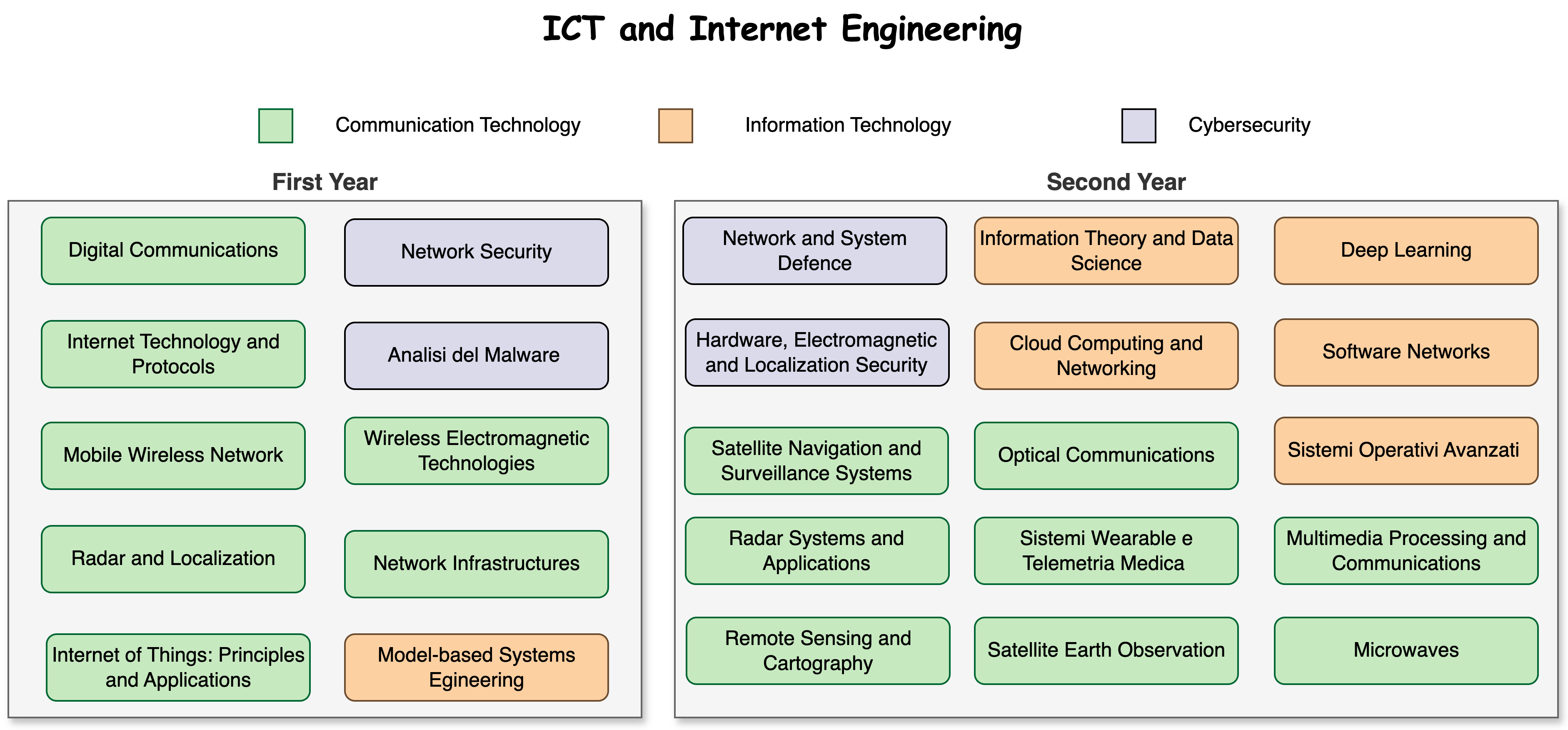Introduction of the Course of Study
The ICT & Internet Engineering Master’s Degree Course of Study is a programme that focuses on the design, development, implementation and management of secure systems for communication and information processing. The corresponding technological sector is that of the Information and Communication Technologies (ICT), which plays a fundamental and strategical role in every modern society by enabling the technological progress in several areas, including health, environment and energy, transportation, commerce, public services, entertainment, national security, education and research.
The Master’s Degree course of Study aims to provide students with fundamental skills in telecommunications, information technology, and security that will enable them to specialize in the ICT field. Students will become highly trained, flexible, and skilled professionals to address technical problems of ICT systems, services, and applications. After completing this degree in ICT & Internet Engineering, the graduates can choose from a variety of career paths. They are able to work as Network Engineers, Software Developers, System Analysts, Communication Specialists, Cybersecurity Specialists or ICT Project Managers. Employment sectors include Telecommunication companies, Software Development companies, IT Consultancy companies, Research organizations and Government agencies.
What you’ll learn
Choose your path
After taking the mandatory subjects, you can choose your path and tailor your Master’s Degree Course to your passions.
Cybersecurity
Networks and systems attack and defence
Internet of Things and Cloud
Sensor networks, data analytics and cloud computing application development.
Space Integrated Systems
Earth Observation services, Satellite Communications and navigation with terrestrial infrastructure.
Sensing Systems
Collecting, monitoring, analyzing, and responding to various physical sources and phenomena.
Connectivity Infrastructures
Modern connectivity infrastructure for seamless global communications
Job and career outlook
There are many different sectors in the computing and ICT industry that our graduates can look into for a job since ICT and Internet Engineering fulfils the need for a new wave of further job opportunities in the technology and service industry, both in the public and the private sector.
They could decide to work with companies that design, produce and install equipment, systems and infrastructures relating to the acquisition and transmission of information and their use in telematic applications; telecommunications companies providing remote sensing and radiolocation services; public telecommunications regulatory companies; air, land and naval traffic control companies.
Some of the possible career paths are:
- Web-based Systems Analyst
- Application Designer
- ICT Technologies Expert
- Software Developer
- E-Health Specialist
- IT Consultant
- System Analyst
- Network Engineer
- Cybersecurity Specialist
- Internet of Things Specialist
- Big Data Scientist
- Your own start-up
THE COURSE OF STUDY
Why study ICT and Internet Engineering?
Just as the spread of Computer has led to the creation of new jobs, so the spread of the Internet has led to the need for new experienced professionals capable of coping with all the problems concerning the Internet-related systems, through a systematic approach that allows to develop multidisciplinary solutions, methods and technologies. ICT and Internet Engineering fulfils the need for a new wave of further job opportunities in both technology and service industry, owing to the trend towards big data , smart infrastructures, software-rich networks, Internet of Things, smartphone applications etc. The course offers opportunities in many sectors currently revolutionized by ICT in Italy and abroad: Web-based Systems, Services, Application Design, ICT Technologies, Integration for Web Enterprises, Energy, Health, Environment Protection, Tourism, Automotive, Constructions, Defense, Public Administration, Cybersecurity and last but not least your start-up.
TOR VERGATA UNIVERSITY
Why choose Tor Vergata University?
The Campus of Tor Vergata University is about 40 minutes tube ride from the historical city centre of the “Eternal City” Rome and 20 minutes far from the peaceful Castelli Romani area, notorious for its vineyards and hillside landscape.
Tor Vergata’s School of Engineering, is located in a vast 600-hectare campus. The School is provided with its own library, teaching and research facilities, reading rooms, laboratories, canteens and green areas where students can experience a real campus life.
The School of Engineering is composed of18 Departments, 6 libraries, 350 classrooms and 29 laboratories.
Find out how to reach us.




